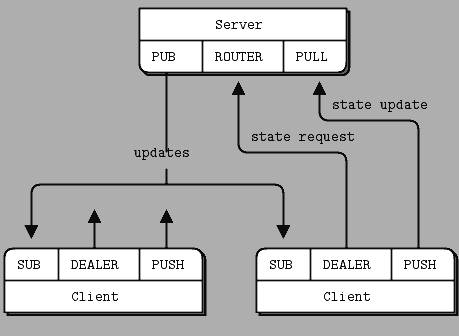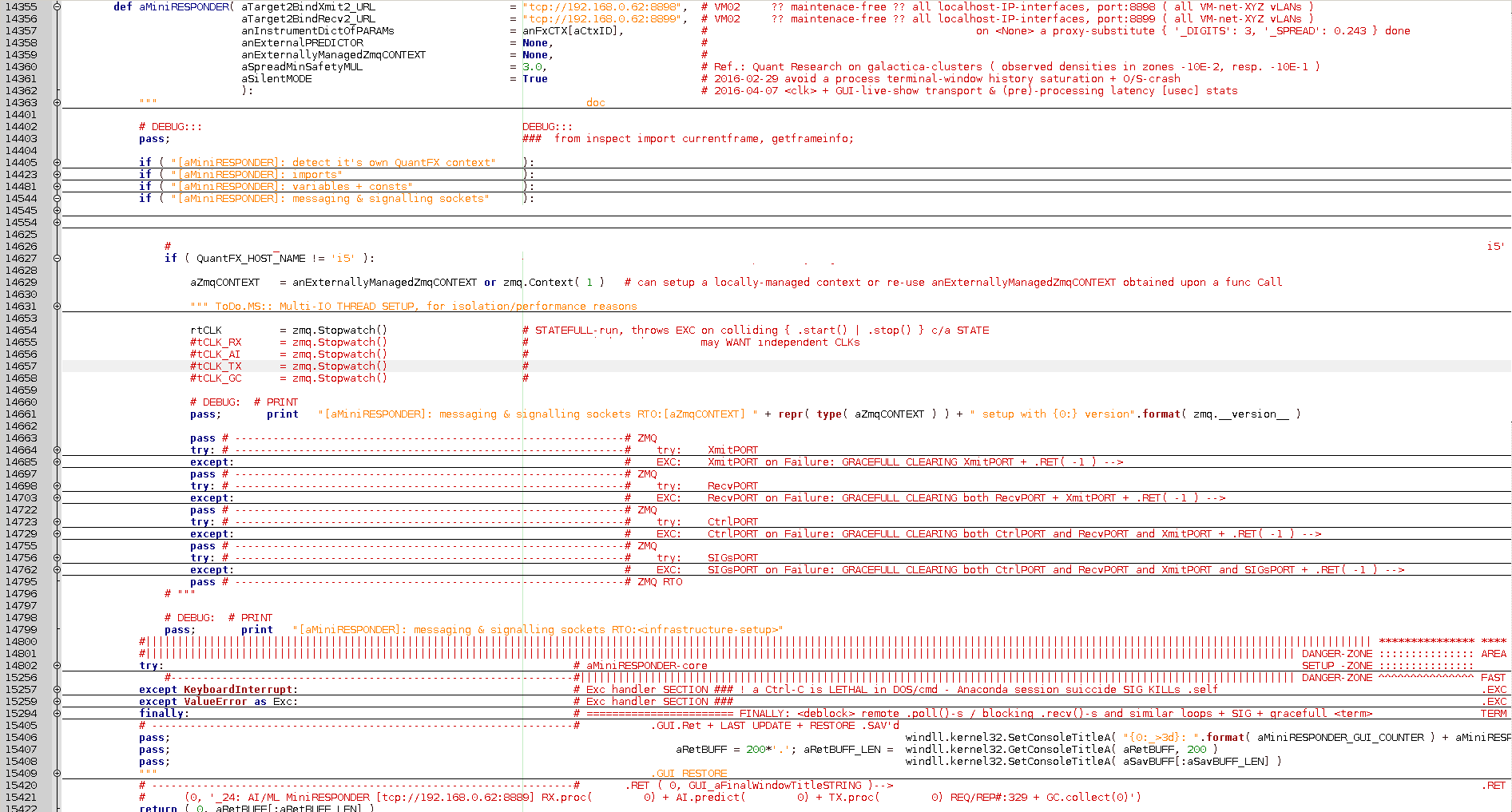This is not the right way to use a Messaging Queue.
A1: The issue is your server finally has to block, as client code does not retrieve any answer while the REQ/REP-pattern requires to do so. The zeromqServer.php on the REP side will simply not attempt to recv() another message from an associated client ( on the REQ side of the Formal Communication Patter ) until the client has been physically delivered ( into an internal buffer ) and has recv()-ed the "reply"-message from the zeromqServer.php side.
Earlier versions of ZeroMQ, ver. 2.1 et al, used to have an unlimited, infinite, default limit sizing of a node's internal message queues and memory-management, used for a low-level I/O-thread buffering, before the data was copied into O/S-kernel resources and released from ZeroMQ memory footprint.
The newer versions of ZeroMQ, ver 3.x+, have the so called HWM-s ( a.k.a. High-Water-Mark-s ) by default "just" 1000 messages oustanding "short", after which the respective piece of such ZeroMQ resource starts to block or drop messages.
While a reactive attempt to explicitly increase HWM-settings management looks like a dirty way to solve a principal design error, another ZeroMQ warning is fair on this for further caution to go just in this direction ( ØMQ does not guarantee that the socket will accept as many as ZMQ_SNDHWM messages, and the actual limit may be as much as 60-70% lower depending on the flow of messages on the socket ).
Forgetting or being unable to do this ( Ref.: as the OP code has already demonstrated ):
//$reply = $requester->recv();
means your REQ/REP Formal Communication Pattern "pendulum" becomes irreversibly deadlocked ( forever ).
A2: Basic REQ/REP Formal-Communication-Pattern sounds straight, but has a few dangerous features, the observed blocking is being just one of this. Some additional steps might be taken code-wise, to deploy XREQ/XREP, DEALER/ROUTER and other tools, but the design should be revised ground up, not just SLOC by SLOC, as there seems to be a lot of things to realise, before designing a code. One of the major mistake is to assume a message is sent once a send() method has been ordered. Not the case in ZeroMQ.
Also the code-design should assume an uncertain nature of a message deliver and handle properly both the missing message problem and any kind of a distributed-service blocking incident ( deadlock, livelock, buffer-threshold overflow, old/new-API conflicts as there is no explicit warranty any of your messaging peers ( there is no central message-broker in ZeroMQ ) has the very same version of ZeroMQ API / protocol implemented on it's localhost side -- so there is indeed a lot of new points of view, during the code design )
The best way to do this
If you can trust and believe in a piece of a hands-on experience, your best next step ought be to download and read the fabulous Pieter HINTJENS' book "Code Connected, Volume 1", where Pieter has a lot of insights on distributed processing, including many hints and directions for reliable-patterns, as you will like to implement.
Do read the book, it is both worth your time and you will likely revisit the book many times, if you stay in distributed software design, so do not hesitate to start right now jumping to such a 400+ pages cookbook from the Master of Masters, the Pieter HINTJENS out of questions is.
Why? The real world is typically much more complex
Just one picture, Fig.60 from the above-mentioned book to forget about individual archetype's re-use and to realise the need for a proper end-to-end distributed system design perspective, including blocking-avoidance and deadlock-resolution strategies:
![Transport Plane + SIG Plane]()
Just to have some idea, look into the following code-example, from a simple distributed messaging, where aMiniRESPONDER process uses multiple ZeroMQ channels.
![enter image description here]()
How to improve your implementation in a fairly large Web PHP-application domain?
Learn how to both prevent ( design-wise ) and handle ( deux-ex-machina type ) other collisions.
PHP has on it's own all proper syntax-constructors for this type of algorithmisation, but the architecture and design is in your hands, from start to end.
Just to realise, how bigger the collisions-aware { try:, except:, finally: } style of a ZeroMQ signalling-infrastructure setup / system-part / ZeroMQ graceful-termination efforts are, check the [SoW] just by row numbers:
14544 - 14800 // a safe infrastructure setup on aMiniRESPONDER side ~ 256 SLOCs
15294 - 15405 // a safe infrastructure graceful termination ~ 110 SLOCs
compared to the core-logic of the event-processing segment of aMiniRESPONDER example
14802 - 15293 // aMiniRESPONDER logic, incl. EXC-HANDLERs ~ 491 SLOCs
A final note on ZeroMQ-based distributed systems
Demanding? Yes, but very powerful, scaleable, fast and indeed rewarding on proper use. Do not hesitate to invest your time and efforts to acquire and manage your knowledge in this domain. All your further software projects may just benefit from this professional investment.


